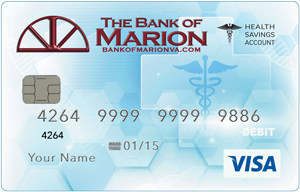Health Savings Accounts (HSA)
Setting up a Health Savings Account can appear difficult and intimidating. Don't worry. We can help you establish your own personal account and start benefiting from its features and advantages. Let's start with the basics.

Health Savings Accounts FAQ
What is a Health Savings Account?
A Health Savings Account allows individuals to pay for current health expenses and save for future qualified medical expenses on a pre-tax basis. Funds deposited into an HSA are not taxed. The balance in the HSA grows tax-free and that amount is available tax free to pay medical costs.
By law, you can only contribute money to an HSA if you participate in a qualified High Deductible Health Plan (HDHP). An HDHP is a plan with a higher deductible than a traditional insurance plan.
Your voluntary contributions to your HSA reduce your taxable income. When you enroll in a High Deductible Health Plan (HDHP), the health plan determines whether you are eligible for a Health Savings Account (HSA), or a Health Reimbursement Arrangement (HRA) based on the information you provide.
What are the basic features of an HSA?
Your own HSA voluntary contributions are tax-deductible. Your own HSA contributions are either tax-deductible or pre-tax (if made by payroll deduction). See IRS Publication 969
- Interest earned on your account is tax-free
- Tax-free withdrawals may be made for qualified medical expenses
- Unused funds and interest are carried over, without limit, from year to year
- You own the HSA, and it is yours to keep - even when you change plans or retire
- Your HSA balance is carried over from year-to-year
- Your HSA is administered by a trustee/custodian
How will an HSA plan save me money?
An HSA plan may save you money through lower premiums, tax savings, and money deposited in your account which can be used to pay your deductible and other out-of-pocket medical expenses in the current year or in the future.
What are the 2022 and 2023 contribution limits to an HSA?
2022
Individual
$3,650
Family
$3,850
Catch-up Contribution (Age 55)
$1,000
2023
Individual
$3,850
Family
$7,750
Catch-up Contribution (Age 55)
$1,000
What are eligibility requirements for an HSA?
- Must be 18 years old
- Must be covered under a High Deductible Health Plan (HDHP
- Must not be enrolled in Medicare
- May not be a dependent on another individual’s tax return
- Must be a U.S. Citizen
- Must have a tax id number
Which expenses are considered IRS-qualified medical expenses?
You can pay for a variety of medical expenses including deductibles, co-insurance, prescriptions, dental and vision care, and more. For a complete list of IRS-qualified medical expenses visit IRS.GOV.
Do I need to submit receipts for my HSA purchases?
No. You do not submit receipts to us. You are required to keep your receipts for qualified medical expenses.
How do I pay my qualified medical expenses from my HSA account?
We will provide you with a special Health Services Account Debit Card. You can also reimburse yourself for medical expenses by using your debit card at an ATM machine. Be sure to keep any receipts for medical expenses you pay.
What tax documents will the bank send to me?
You may receive both a Form 1099SA which includes both qualified and non-qualified expenses and a Form 5498SA which includes contributions to your HSA.
How can I check my HSA balance?
- A teller at any of our full-service branches can check your balance
- You can obtain a balance online or at any ATM machine
- You can call our automated phone banking system
Can I use my HSA account for a spouse?
Yes. HSA balances can be used for your spouse and children. The spouse can be issued a debit card.
Can I use my HSA account to pay for non-qualified expenses?
If you pay for unqualified HSA expenses before age 65, you must report those expenses on your tax return and pay a penalty and taxes.
Does my HSA account earn interest?
Yes. It is a variable interest-bearing account. The interest rate can change at any time without notice.
High Deductible Health Plans (HDHP)
What is a High Deductible Health Plan?
A High Deductible Health Plan (HDHP) is a health plan that combines a Health Savings Account (HSA) or a Health Reimbursement Arrangement (HRA) with traditional medical coverage. It provides insurance coverage and a tax-advantaged way to help save for future medical expenses.
The HDHP/HSA or HRA gives you greater flexibility and discretion over how you use your health care dollars, because the funds can be used to cover qualified medical expenses that are not covered by your health plan.
HDHPs may have a higher annual deductible than traditional health plans:
For 2022, an HDHP has a minimum annual deductible of $1,400 for Self Only coverage and $2,800 for Self Plus One/Self and Family coverage. The deductible amount is indexed every year.
For 2022, HDHPs have annual out-of-pocket limits which do not exceed $7,000 for Self Only coverage and $14,000 for Self Plus One/Self and Family coverage.
For 2023, an HDHP has a minimum annual deductible of $1,500 for Self Only coverage and $3,000 for Self Plus One/Self and Family coverage. The deductible amount is indexed every year.
For 2023, HDHPs have annual out-of-pocket limits which do not exceed $7,500 for Self Only coverage and $15,000 for Self Plus One/Self and Family coverage.
If you are an individual who wants to investigate the many advantages of a Health Saving Account – or a business looking to add to its employee benefits package - contact us today. We're ready to help you take control of managing your healthcare costs.
